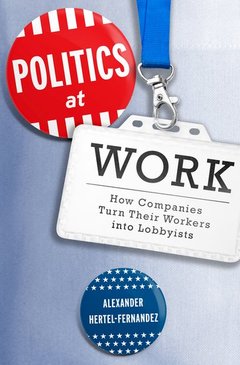Description
Politics at Work
How Companies Turn Their Workers into Lobbyists
Studies in Postwar American Political Development Series
Author: Hertel-Fernandez Alexander
Language: English
Subject for Politics at Work:
Publication date: 04-2018
360 p. · 23.6x16.5 cm · Hardback
360 p. · 23.6x16.5 cm · Hardback
Description
/li>Biography
/li>
Employers are increasingly recruiting their workers into politics to change elections and public policy - sometimes in coercive ways. Using a diverse array of evidence, including national surveys of workers and employers, as well as in-depth interviews with top corporate managers, Politics at Work explains why mobilization of workers has become an appealing corporate political strategy in recent decades. The book also assesses the effect of employer mobilization on the political process more broadly, including its consequences for electoral contests, policy debates, and political representation. In Politics at Work, Alexander Hertel-Fernandez shows that while employer political recruitment has some benefits for American democracy - for instance, getting more workers to the polls - it also has troubling implications for other aspects of political participation. Workers face considerable pressure to respond to their managers' political requests because of the economic power employers possess over workers. In spite of these worrisome patterns, corporate managers report that mobilization of workers is an important strategy for influencing politics. Politics at Work documents how companies consider mobilization of their workers to be even more effective at changing public policy than making campaign contributions or buying electoral ads. Hertel-Fernandez concludes by discussing when and why employer recruitment efforts represent problematic violations of workers' political rights. He then reviews policy proposals that could protect workers from employer political coercion and could also win the support of majorities of Americans. By carefully examining a growing yet underappreciated political practice, Politics at Work contributes to our understanding of the changing workplace, as well as the ways that businesses influence politics in the United States. The book offers fresh perspectives on debates over money in politics and will be valuable to anyone interested in the connections between inequality, public policy, and American democracy.
Alexander Hertel-Fernandez is an Assistant Professor in Columbia University's School of International and Public Affairs. A scholar of lobbying, business-government relations, and public policy, Hertel-Fernandez received his PhD in Government and Social Policy from Harvard University in 2016. His research has appeared in the American Prospect, Democracy Journal, the New York Times, the New Yorker, and the Washington Post, as well as numerous scholarly journals.
© 2024 LAVOISIER S.A.S.




